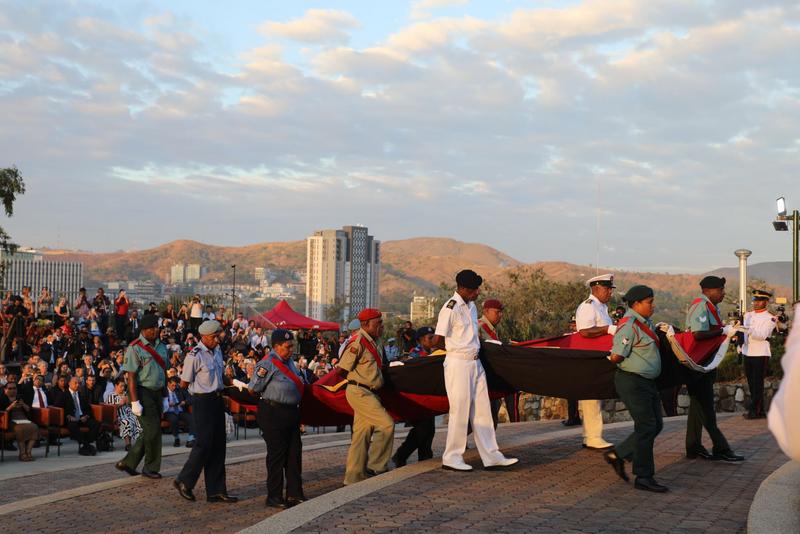Fifty years after Papua New Guinea’s flag first rose on Independence Hill, thousands of citizens, leaders and international partners gathered at the same site on 16 September to commemorate the country’s Golden Jubilee.
At the heart of the ceremony was Prime Minister James Marape’s call for unity, honesty and renewed service as PNG enters its next half-century.
“This is a time to reset our minds, our purposes, and our zeal,” Marape said.
A ceremony rich in symbolism
Independence Hill once again became the stage for the red, black and gold flag, bearing the bird of paradise and Southern Cross, which was hoisted as the national anthem played.
The Duke of Edinburgh joined Pacific leaders, ambassadors, church dignitaries and representatives of development partners. Families of past prime ministers and members of the founding generation also attended, visibly moved as the flag was raised where they had first seen it in 1975.
Honoring the Somare generation
Marape began his speech with tributes to the “Somare generation” led by Grand Chief Sir Michael Somare. He acknowledged Dr. John Momis, Sir John Kaputin, Lady Veronica Somare, Lady Stella Chan and families of other founding leaders.
“They were the greatest generation Papua New Guinea ever produced,” Marape said. “They dared to believe that a thousand tribes, speaking over 800 languages, could unite as one people, one nation, one country. Their achievement will never be repeated.”
Marape also underscored PNG’s deep roots, citing the UNESCO-listed Kuk Early Agricultural Site, with evidence of farming 10,000 years ago, and Lapita pottery in New Ireland that links PNG to Pacific seafaring traditions.
“We are an ancient people,” he said. “Long before roads, planes, or medicines, we traded, coexisted, and thrived.”
Recognizing partners and citizens
The prime minister praised the role of missionaries, churches and educators. “Papua New Guinea can claim its place as the last country on Earth to have received the Gospel of Jesus Christ. Since then, the church has been our moral anchor, shaping our education, health, and leadership systems,” he said.
He also thanked Australia, describing independence as grounded in respect and goodwill. He cited Sir John Guise’s words from 1975: “We are lowering the Australian flag, not tearing it.”
Marape saluted “unsung heroes” — teachers, health workers, public servants, police, defense personnel and farmers. “You have served your flag well. You have honoured your Constitution. The last fifty years belong to you as much as to our leaders.”

Achievements and challenges
Marape called PNG’s journey since 1975 one of resilience. Despite early political instability, he said the country had maintained democracy, built infrastructure and expanded education while producing professionals who excel internationally.
“Fifty years ago, we could not have imagined our daughters flying Airbus aircraft across the Pacific,” he said.
But he admitted that challenges persist. “We still have poverty, isolation, unemployment, and corruption robbing us of resources. Our economy has yet to fully sustain a nation of over 10 million people,” Marape said. “Yet history shows Papua New Guineans never give up.”
Bougainville and reconciliation
Turning to Bougainville, Marape expressed regret for the conflict but praised the island’s people for choosing peace.
“In 1975 we were one, and today we are still one,” he said. “Bougainville’s story is also Papua New Guinea’s story — a story of resilience, reconciliation, and hope. The peace we share today was won not by war, but by the courage of people to embrace peace.”
More than 100 Bougainville children joined the Port Moresby celebrations as a symbol of unity.
A vision for the future
Marape set out a national agenda with agriculture, infrastructure, renewable energy, governance reform and judicial independence as its pillars. He pledged to transition one million families into commercial farming, modernise public service with artificial intelligence, and grow the economy to 500 billion kina by 2045.
“The next 50 years must be about nation building, renewal, and transformation,” he said. “Let us preserve our democracy at all costs, for it is democracy that has carried us this far.”
A personal journey
Marape recalled growing up barefoot in Nomad River, Western Province, when he first saw the flag raised in 1975.
“Fifty years later, that same boy stands here as your Prime Minister,” he said. “This is the story of Papua New Guinea. If a child from the remotest of the remote can rise to this office, then every boy and girl in this country has the same potential.”
Quoting John F. Kennedy, he appealed to older citizens: “Do not ask what others are doing for the country. Ask yourself: what are you doing for Papua New Guinea?”
A call to action
Closing his address, Marape urged citizens to see the flag as a symbol of collective purpose.
“Our diversity is not our weakness but our greatest strength. The bird of paradise on our flag soars today — let our spirits soar with it. The next 50 years belong to our children. Let us serve them by building a nation that is united, prosperous, and just.”










